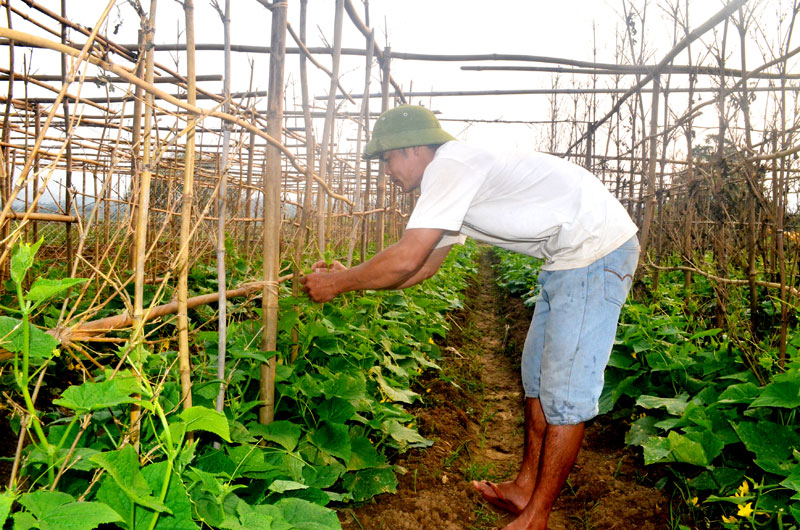


(HBO) - On the area of 2,000 m2, if he only plants one rice crop, Bui Van Lung's family in Bao 3 Hamlet, Thanh Hoi Commune (Tan Lac) certainly does not have enough food, the life is unstable.

On the area of 700 square meters of one -
crop land, Mr. Quach Minh Phuong's family, Bao 3 Hamlet, has changed to plant
green pumpkin, cucumber to bring high economic efficiency.
According to calculations of Mr. Lung, on the
same land area of 2,000 m2, if planting watermelons in each crop gets about 5
tons, the purchase price at the field is about 10,000 VND / kg, each family
income is about 50 million VND, 10 times higher than rice. The time of planting
watermelon is shorter than that of rice, so it is possible to turn round with
continuous crop of vegetables, beans for a short time. Therefore, in addition
to the income from watermelon, Mr. Lung's family earned more tens of millions
of other incomes from other kinds of vegetables every year.
like Mr. Lung’s family, the family of Mr.
Quach Minh Phuong in Bao 3 village has an area land of 700 m2. Due to the
conversion of ineffective rice fields into planting green pumpkin, red pumpkin
combined with vegetables, integrated with cucumber, kohlrabi, etc., his family has
income of tens of millions of dongs, which is higher dozens of times than the
cultivation of only rice each year.
Mr. Bui Van Thanh, Secretary of Party
Committee of Thanh Hoi Commune said: According to statistics, up to now, the
commune has converted more than 50 hectares. During the implementation of the
resolution, the staffs and party members were the first pioneers, such as the
families of Bui Van Nhon, Bui Van Hien.
In Thanh Hoi, every village has typical
models of economic development such as the models of planting red grapefruit,
green grapefruit, citronella, pink banana, Thai jackfruit, etc. Typical models
are the one of growing safe vegetables in the Sung village, from only 2 - 3
households planted on a small area initially to that the model has been
replicated and developed in the whole village with a total area of over 5
hectares at present. Compared with rice cultivation, the value of income in the
same area after the conversion to grow vegetables has increased from 6 to 7
times, even though in some places, the income increased ten times. In 2010, the
average income of the commune reached VND 6 million / person by 2017, it has
been increasing 4.4 times, reaching VND 26.4 million / person. The rate of poor
households according to the new commune standards reduced to 9.64%.